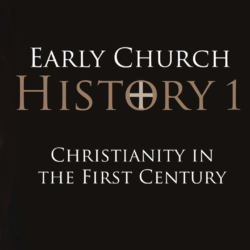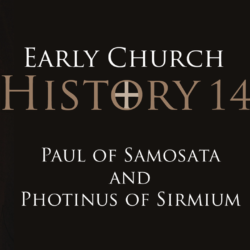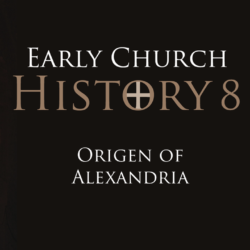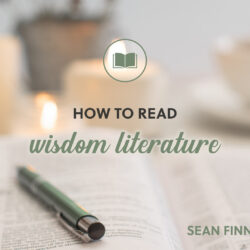In this lecture you’ll learn about the Anabaptist movement and their distinctive beliefs. We’ll consider the life of Michael Sattler, an important leader of the Anabaptists, and see how he stood firm in his faith even when his life was at risk. Next, you’ll find out about Melchior Hoffman and how his followers took over the city of Münster, eventually resulting in chaos, immorality, and significant loss of life. Sadly, European governments tended to lump all radicals together so that peaceful Anabaptists and violent apocalypticists got painted with the same brush. Lastly, we’ll look at Menno Simons who became so influential among the Anabaptists that a sizeable group took his name, becoming the Mennonites. Significant events in this lecture include:
- 1527 Schleitheim Confession
- 1527 Michael Sattler burned at the stake
- 1535 Münster captured
- 1537 Menno Simons becomes an Anabaptist
- 1544 Anabaptists in Netherlands called Mennonites
- 1569 Dirk Willems rescues pursuer
This is lecture 4 of a history of Christianity class called Five Hundred: From Martin Luther to Joel Osteen.
All the notes are available here as a pdf.
—— Notes ——
Anabaptist Distinctives
- Bible as the standard, not tradition or church hierarchy
- Discipleship & love (literal obedience to Jesus’ Sermon on the Mount)
- Separation from the world (especially government)
- Home fellowships (voluntary church, no infant baptism)
- Congregational polity
Michael Sattler (1495-1527)
- 1525 -left Benedictine monastery, married a nun named Margaretha, expelled from Zurich
- 1526 – became Anabaptist
- 1527 – major leader in writing Schleitheim Confession[1]
- Baptism for those who repent only
- The ban practiced according to Matthew 18.15-17
- Communion for baptized only
- Separation from the world (including government, Catholics, & Protestants)
- Pastors supported and given authority
- The sword not to be used
- Oaths are not to be taken
- May 21, 1527 – burned at the stake
Articles or Charges against Michael Sattler[2]
- First, that he and his adherents have acted contrary to the mandate of the Emperor.
- Secondly, he has taught, held, and believed that the body and blood of Christ are not present in the sacrament.
- Thirdly, he has taught and believed that infant baptism does not conduce to salvation.
- Fourthly, they have rejected the sacrament of extreme unction.
- Fifthly, they have despised and condemned the mother of God and the saints.
- Sixthly, he has declared that men are not to swear before the authorities.
- Seventhly, he has commenced a new and unheard of custom in regard to the Lord’s Supper, placing the bread and wine on a plate, and eating and drinking the same.
- Eighthly, he has left the order and married a wife.
- Ninthly, he has said that if the Turks should invade the country, no resistance ought to be offered them; and if it were right to wage war, he would rather take the field against the Christians than against the Turks; and it is certainly a great matter, to set the greatest enemies of our holy faith against us.
Thereupon Michael Sattler requested permission to confer with his brethren and sisters, which was granted him. Having conferred with them for a little while, he began and undauntedly answered thus: “In regard to the articles relating to me and my brethren and sisters, hear this brief answer:
“First, That we have acted contrary to the imperial mandate, we do not admit; for the same says that the Lutheran doctrine and delusion is not to be adhered to, but only the Gospel and Word of God. This we have kept; for I am not aware that we have acted contrary to the Gospel and the Word of God; I appeal to the words of Christ.
“Secondly, That the real body of Christ the Lord is not present in the sacrament, we admit; for the Scripture says: Christ ascended into heaven and, sitteth on the right hand of His heavenly Father whence He shall come to judge the quick and the dead; from which it follows, that if He is in heaven, and not in the bread, He may not be eaten bodily. Mark 16:19; Acts 1:9; Col. 3:1; Acts 10:42; II Tim. 4:1.
“Thirdly, As to baptism we say: Infant baptism is of no avail to salvation; for it is written that we live by faith alone. Again: He that believeth and is baptized shall be saved. Peter likewise says: The like figure whereunto even baptism doth also now save us (not the putting away of the filth of the flesh, but the answer of a good conscience toward God), by the resurrection of Jesus Christ. Romans 1:17; Mark 16:16; I Pet. 3:21.
“Fourthly, We have not rejected the oil; for it is a creature of God, and what God has made is good and not to be refused; but that the pope, the bishops, monks and priests can make it better, we do not believe; for the pope never made anything good. That of which the epistle of James speaks is not the pope’s oil. Gen. 1:11; I Tim. 4:4; James 5:14.
“Fifthly, We have not condemned the mother of God and the saints; for the mother of Christ is to be blessed among all women; for to her was accorded the favor of giving birth to the Saviour of the whole world. But that she is a mediatress and advocatess, of this the Scriptures know nothing; for she must with us await the judgment. Paul said to Timothy: Christ is our Mediator and Advocate with God. As regards the saints; we say that we who live and believe are the saints; which I prove by the epistles of Paul to the Romans, Corinthians, Ephesians; and in other places where he always writes: To the beloved saints. Hence we that believe are the saints; but those who have died in faith we regard as the blessed. Luke 1:28; Matthew 1:21; I Tim. 2:5; I Cor. 1:2; Eph. 1:1; Rev. 14:13.
“Sixthly, We hold, that we are not to swear before the authorities: For the Lord says: Swear not; but let your communication be, Yea, yea; Nay, nay. Matt. 5:34; James 5:12.
“Seventhly, When God called me to testify of His Word, and I had read Paul, and also considered the unchristian and perilous state in which I was; beholding the pomp, pride, usury, and great whoredom of the monks and priests, I went and took unto me a wife, according to the command of God; for Paul well prophesies concerning this to Timothy: In the latter time it shall come to pass that men shall forbid to marry, and command to abstain from meats which God hath created to be received with thanksgiving. I Cor. 7:2; I Tim. 4:3.
“Eighthly, If the Turks should come, we ought not to resist them; for it is written: Thou shalt not kill. We must not defend ourselves against the Turks and others of our persecutors, but are to beseech God with earnest prayer to repel and resist them. But that I said, that if warring were right, I would rather take the field against the so-called Christians, who persecute, apprehend and kill pious Christians, than against the Turks, was for this reason: The Turk is a true Turk, knows nothing of the Christian faith; and is a Turk after the flesh; but you, who would be Christians, and who make your boast of Christ, persecute the pious witnesses of Christ, and are Turks after the spirit.
“In conclusion: Ye ministers of God, I admonish you to consider the end for which God has appointed you, to punish the evil, and to defend and protect the pious. Whereas, then, we have not acted contrary to God and the Gospel, you will find that neither I nor my brethren and sisters have offended in word or deed against any authority. Therefore, ye ministers of God, if ye have not heard or read the Word of God, send for the most learned, and for the sacred books of the Bible, of whatsoever language they may be, and let them confer with us in the Word of God; and if they prove to us with the Holy Scriptures, that we err and are in the wrong, we will gladly desist and recant and also willingly suffer the sentence and punishment for that of which we have been accused, but if no error is proven to us, I hope to God, that you will be converted, and receive instruction.” Wisd. 6:4; Acts 25:8; Rom. 13:4; Acts 25:11.
Upon this speech the judges laughed and put their heads together, and the town clerk of Ensisheim said:
“O you infamous, desperate villain and monk, shall we dispute with you? The hangman shall dispute with you, I assure you.”
Michael said: “God’s will be done.”
The town clerk said: “It were well if you had never been born.”
Michael replied: “God knows what is good.”
Town Clerk: “You arch-heretic, you have seduced the pious; if they would only now forsake their error, and accept grace.”
Michael: “Grace is with God alone.”
One of the prisoners also said: “We must not depart from the truth.”
Town Clerk: “You desperate villain and arch-heretic, I tell you if there were no hangman here, I would hang you myself, and think that I had done God service.”
Michael: “God will judge aright.”
Thereupon the town clerk said a few words to him in Latin, what we do not know.
Michael Sattler answered him Judica.
The town clerk then admonished the judges and said: “He will not cease from this talk today; therefore my Lord Judge, proceed with the sentence; I will commit it to the law.”
The judge asked Michael Sattler whether he also committed it to the law.
He replied: “Ye ministers of God, I am not sent to judge the Word of God; we are sent to bear witness of it, and, hence, cannot consent to any law, since we have no command from God concerning it; but if we can not be discharged from the law, we are ready to suffer for the Word of God whatever sufferings are, or may be imposed upon us all for the sake of the faith in Christ Jesus our Saviour, as long as we have breath within us; unless we be dissuaded from it by the Scriptures.”
The town clerk said: “The hangman shall convince you; he shall dispute with you, arch-heretic.”
Michael: “I appeal to the Scriptures.”
Then the judges arose, and went into another room, where they remained for an hour and a half, and determined on the sentence. Matt. 6:10; John 16:2; I Cor. 4:5; John 1:8; Job 27:3; Acts 25:11.
In the meantime, some in the room treated Michael Sattler most unmercifully, heaping reproach upon him. One of them said: “What have you in expectation for yourself and the others, that you have so seduced them?” With this, he also drew forth a sword which lay upon the table, saying: “See, with this shall they dispute with thee.” But Michael did not answer upon a single word concerning his person, but willingly endured it all. One of the prisoners said: “We must not cast pearls before swine.” Matt. 27:14; 7:6.
Being also asked, why he had not remained a lord in the convent, Michael answered: “According to the flesh I was a lord; but it is better so.” He did not say more than what is recorded here, and this he spoke fearlessly.
The judges having returned to the room, the sentence was read. It was as follows: “In the case of the Governor of his Imperial Majesty versus Michael Sattler, judgment is passed, that Michael Sattler shall be delivered to the executioner, who shall lead him to the place of execution, and cut out his tongue; then throw him upon a wagon, and there tear his body twice with red hot tongs; and after he has been brought without the gate, he shall be pinched five times in the same manner.”
After this had been done in the manner prescribed, he was burned to ashes as a heretic. His fellow brethren were executed with the sword, and the sisters drowned. His wife, also, after being subjected to many entreaties, admonitions and threats, under which she remained very steadfast, was drowned a few days afterwards. Done the 21st day of May, A. D. 1527.
Münster
- Melchior Hoffman (1495-1543)
- Preached about the end of the world in 1533
- Followers called Melchiorites
- 1532 – many Melchiorites go to Münster
- 1534 – Jan Matthys (1500-1534) proclaims Münster “New Jerusalem”
- John of Leiden (1509-1536) took over after Matthys died
- Proclaimed himself king
- Instituted polygamy
- Established communism
- 1535 – city retaken by expelled bishop and Catholic army
- People associated Anabaptists with Münster and fiercely persecuted them, fearing that they may try to take over another city
Menno Simons (1496-1561)
- 1515 – became a priest
- Never read the Bible out of fear it would adversely influence him
- 1526 – questioned transubstantiation
- 1531 – started studying infant baptism
- 1535 – conversion precipitated by his brother who died at Münster
- He “prayed to God with sighs and tears that He would give to me, a sorrowing sinner, the gift of His grace, create within me a clean heart, and graciously through the merits of the crimson blood of Christ, He would graciously forgive my unclean walk and unprofitable life”
- 1536 – left priesthood and became Anabaptist
- 1537 – ordained as Anabaptist pastor by Obbe Phllips
- 1544 – Anabaptists in Netherlands referred to as Mennonites
[1] To read the full Schleitheim Confession visit anabaptists.org/history/the-schleitheim-confession.html
[2] Taken from Thieleman J. van Braght, Martyr’s Mirror (Harrisonburg, VA: Herald Press 1987), pp. 416-418.
—— Links ——
- See all the episodes of Five Hundred: From Martin Luther to Joel Osteen.
- For a much more in depth treatment of the Reformation period, check out Brad S. Gregory’s History of Christianity in the Reformation Era class at The Teaching Company
- The three main textbooks for this class include:
- The European Reformations by Carter Lindberg
- The Radical Reformation by George Williams
- Modern Church History by Tim Grass
- Check out these other Restitutio historical podcasts
- Intro music: “District Four” by Kevin MacLeod. Licensed under Creative Commons: By Attribution 3.0 License.






